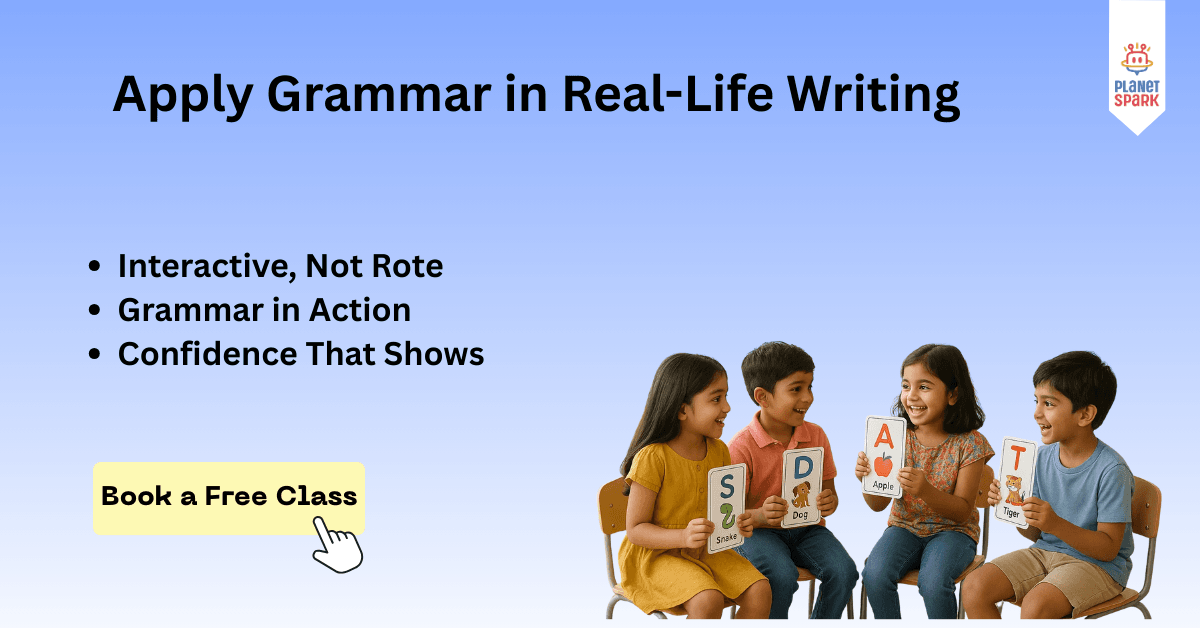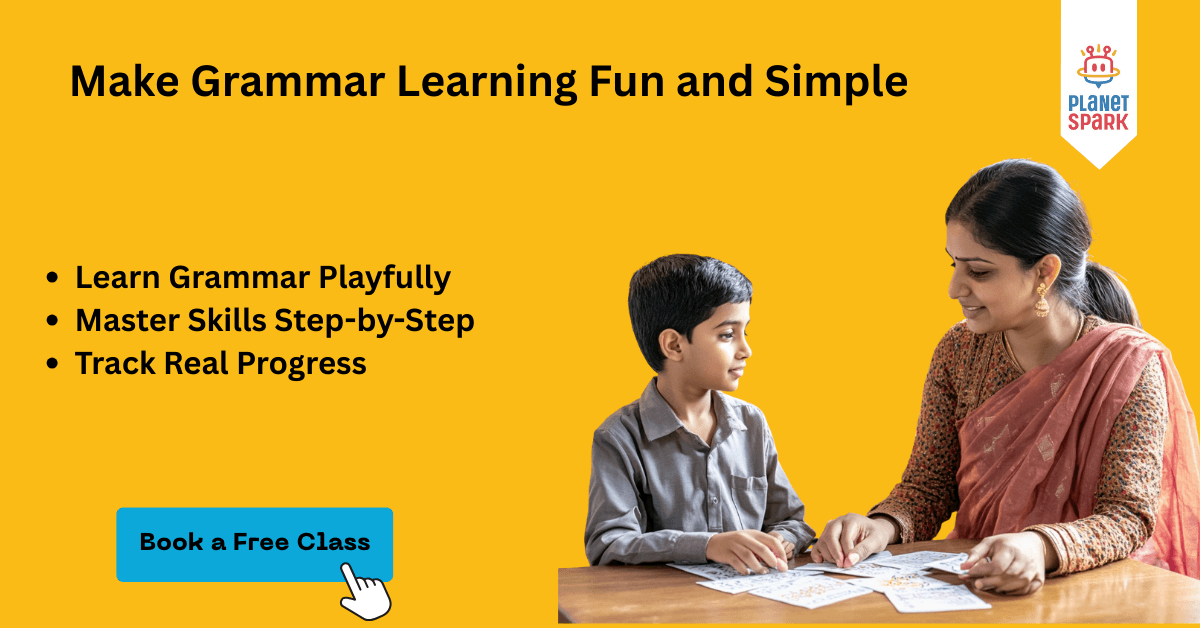If Clause: Rules, Types, and Examples Explained Simply

Table of Contents
- What is an If Clause?
- Importance of If Clauses in English
- If Clause Rules
- Types of If Clauses
- If Clause Examples
- If Clause Examples with Answers
- If Clause Exercises
- Common Mistakes in If Clauses
- If Clause vs Conditional Clause
- Advanced Usage of If Clauses
- Why Learning If Clauses is Important for Kids
- PlanetSpark English Grammar Course
- Frequently Asked Questions (FAQs)
Conditional sentences are an important part of English grammar, and if clauses play a key role in expressing conditions and results. Whether you want to talk about possibilities, hypothetical situations, or regrets about the past, if clauses help you frame your sentences correctly.
In this detailed guide, we will explore if clause rules, if clause examples, types of if clauses, and exercises with answers to help you understand and master them easily. By the end, you’ll have a complete grasp of how to use if clauses in speaking and writing.
What is an If Clause?
An if clause is a part of a conditional sentence that shows a condition. It usually begins with the word “if” and is followed by a result clause that tells what happens when the condition is met.
Example:
If it rains, we will stay home.
If you study hard, you will pass the exam.
Here, the first part (if clause) shows the condition, while the second part (main clause) shows the result.

Importance of If Clauses in English
Express Possibilities – “If you practice daily, you will improve.”
Talk About Hypotheticals – “If I were rich, I would travel the world.”
Express Regrets or Past Conditions – “If she had studied, she would have passed.”
Make Polite Suggestions – “If you could wait here, the teacher will see you soon.”
If clauses make communication richer and allow you to express time, conditions, and possibilities clearly.
If Clause Rules
When learning if clauses, it’s important to remember these basic rules:
Structure – An if clause (condition) + a main clause (result).
If + subject + verb, subject + verb.
Verb Tense Rules –
The verb tense in the if clause determines the meaning (real, possible, or unreal situation).
The main clause tense depends on the condition being expressed.
Comma Usage –
If the if clause comes first, use a comma before the main clause.
If the main clause comes first, no comma is needed.
Example:
If you eat too much, you will feel sick.
You will feel sick if you eat too much.
Do Not Use “Will” in the If Clause –
❌ If you will study, you will pass.
✅ If you study, you will pass.
Struggling with grammar rules like if clauses and tenses? PlanetSpark makes learning fun and interactive.
👉 Book a Free Demo Class today and see your child fall in love with English!
Types of If Clauses
There are four main types of if clauses (conditional clauses). Each one shows a different level of possibility or time frame.
1. Zero Conditional (Facts and Universal Truths)
Structure: If + Present Simple, Present Simple
Use: To talk about general truths, scientific facts, or things that always happen.
Examples:
If you heat water to 100°C, it boils.
If the sun sets, it becomes dark.
2. First Conditional (Real and Possible Future)
Structure: If + Present Simple, will + Verb
Use: To talk about real possibilities or future events.
Examples:
If it rains tomorrow, we will stay home.
If you eat healthy food, you will feel better.
3. Second Conditional (Unreal or Imaginary Present/Future)
Structure: If + Past Simple, would + Verb
Use: To talk about unreal, imaginary, or hypothetical situations.
Examples:
If I won the lottery, I would buy a big house.
If she were taller, she would play basketball.
4. Third Conditional (Unreal Past/Regrets)
Mixed Conditionals
Sometimes, we mix different tenses in if clauses to express past conditions with present results.
Example:
If I had studied medicine, I would be a doctor now.
If Clause Examples
Here are some if clause examples for better understanding:
If you practice daily, you will get better. (First Conditional)
If I were you, I would accept the offer. (Second Conditional)
If they had called me, I would have gone. (Third Conditional)
If the baby is tired, she cries. (Zero Conditional)
If Clause Examples with Answers
If I ___ (be) free tomorrow, I will help you.
Answer: am
If she ___ (study), she would pass the exam.
Answer: studied
If we had left early, we ___ (catch) the bus.
Answer: would have caught
Want your child to master conditional sentences and grammar basics with ease?
👉 Enroll in PlanetSpark’s English Grammar Course and watch them gain confidence in writing and speaking.
If Clause Exercises
Exercise 1: Fill in the blanks
If it ___ (rain), we will stay inside.
If I ___ (win) the lottery, I would buy a car.
If you heat ice, it ___ (melt).
If she had worked hard, she ___ (succeed).
Answers:
rains
won
melts
would have succeeded
Exercise 2: Correct the mistakes
If you will study, you will pass.
Correction: If you study, you will pass.
If I was rich, I will travel the world.
Correction: If I were rich, I would travel the world.
Common Mistakes in If Clauses
Using “will” in the if clause.
Mixing verb tenses incorrectly.
Forgetting commas when if clause comes first.
Confusing between second and third conditionals.
Don’t let grammar hold your child back. With expert mentors, live sessions, and activity-based learning, PlanetSpark ensures every child succeeds.
👉 Sign up now and get started with a Free Demo!
If Clause vs Conditional Clause
An if clause is a type of conditional clause, but conditional clauses can also start with words like unless, provided that, as long as, in case.
Example:
If you come, I will be happy. (If clause)
Unless you try, you won’t succeed. (Conditional clause, not starting with if)
Advanced Usage of If Clauses
Inverted If Clauses (Formal Writing)
If I were rich, I would help you.
Were I rich, I would help you.
Omitting If
If I had known, I would have helped.
Had I known, I would have helped.
Why Learning If Clauses is Important for Kids
Children often struggle with conditional sentences because they mix tenses. Teaching them if clauses with real-life examples and fun activities can make learning grammar easier.
Examples for kids:
If you eat your vegetables, you will grow strong.
If you sleep early, you will feel fresh.
PlanetSpark English Grammar Course
Mastering grammar is not always easy for kids. Concepts like if clauses, tenses, prepositions, and conditional sentences often confuse them, leading to mistakes in both speaking and writing. At PlanetSpark, we make grammar learning simple, interactive, and enjoyable with our English Grammar Course designed especially for young learners.

Why Choose PlanetSpark’s Grammar Course?
Interactive Learning Methods
Kids learn grammar not by memorization but through stories, role-play activities, games, and real-life examples. This ensures they understand the logic behind rules and remember them better.Expert Mentorship
Every child gets personalized feedback and guidance from certified PlanetSpark mentors. This one-on-one attention helps identify weak areas and strengthens grammar step by step.Comprehensive Practice
Learning is reinforced with worksheets, quizzes, live exercises, and writing tasks. Children don’t just study grammar; they practice it until it becomes second nature.Focus on Communication Skills
Beyond rules and structures, the course helps kids apply grammar in speaking and writing confidently, so they can perform well in school and beyond.Engaging Digital Platform
The course is conducted on PlanetSpark’s tech-driven learning platform, where children enjoy interactive classes, gamified quizzes, progress tracking, and instant feedback.
Key Features of the English Grammar Course
Covers all major grammar topics: Tenses, Verbs, Sentence Structure, If Clauses, Articles, Prepositions, Punctuation, and more.
Customized curriculum based on the child’s age and learning level.
Live interactive sessions instead of boring recorded lectures.
Small group or one-on-one sessions for maximum engagement.
Progress reports and assessments shared with parents.
Unique Selling Points (USP)
Activity-based learning instead of rote memorization.
Gamified lessons that keep kids motivated.
Confidence-building approach focusing on communication, not just grammar accuracy.
Trusted by thousands of parents with proven improvement in children’s writing and speaking skills.
👉 With PlanetSpark, grammar is no longer a dry subject, it becomes an exciting journey where kids actively participate, practice, and progress.
Help your child master English grammar with ease and confidence.
👉 Book a Free Demo Class today and see the PlanetSpark difference!
Frequently Asked Questions (FAQs)
Q1. What is an if clause?
An if clause shows a condition in a sentence and is followed by a result clause.
Q2. How many types of if clauses are there?
There are four main types: Zero, First, Second, and Third conditionals.
Q3. Can I use “will” in the if clause?
No. The if clause should not use “will.” Use present or past tense depending on the type.
Q4. What is the difference between first and second conditional?
First conditional talks about real future possibilities, while second conditional talks about imaginary or unreal situations.
Q5. Are if clauses the same as conditional clauses?
Yes, but conditional clauses can also use other words like unless or provided that.
Q6. Can an if clause come at the end of a sentence?
Yes. The if clause can come either at the beginning or the end of a sentence. Example: You will pass if you study hard.
Q7. What is the difference between zero and first conditional?
The zero conditional is used for universal truths or facts (If you heat ice, it melts), while the first conditional is used for real future possibilities (If it rains tomorrow, we will stay inside).
Q8. Can I start a sentence with “if”?
Yes. It is common to start a sentence with an if clause. Just remember to use a comma before the main clause. Example: If you try, you will succeed.
Q9. What is the most common mistake in using if clauses?
The most common mistake is using “will” in the if clause. Example: ❌ If you will come, I will be happy (incorrect). Correct usage: ✅ If you come, I will be happy.
Q10. Are mixed conditionals common in English?
Yes. Mixed conditionals are often used to talk about past conditions with present results. Example: If I had studied harder, I would be more confident today.
Q11. How do if clauses help in writing essays or stories?
If clauses add depth and variety to writing. They help in expressing possibilities, consequences, and imaginative situations, making essays, stories, or conversations more engaging.
Personalized Communication Report
Record a video to get a AI generated personalized communication report for your child

